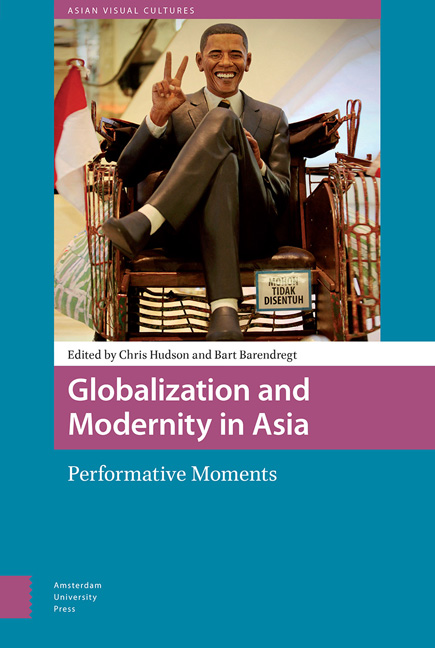Book contents
- Frontmatter
- Contents
- List of Figures
- Acknowledgments
- 1 Global Imaginaries and Performance in Asia
- 2 Globalizing the Imagination: Introductory Reflections
- 3 Weddings, Yoga, Hook-ups: Performed Identities and Technology in Bali
- 4 Super Premium Soft Double Vanilla Rich and the Ideal of Convenience in Japan
- 5 Unearthing the Past and Re-imagining the Present: Contemporary Art and Muslim Politics in a Post-9/11 World
- 6 Keeping Communists Alive in Singapore
- 7 Performative Pedagogies: Lifestyle Experts on Indian Television
- 8 Performing Cities: The Philippines Pavilion at the 2010 Shanghai International Exposition
- 9 Mobile Performance and the In-between: Yogyakarta Comes to Melbourne
- 10 An Islamist Flash Mob in the Streets of Shah Alam: Unstable Genres for Precarious Times
- 11 Pure Love?: Sanitized, Gendered and Multiple Modernities in Chinese Cinemas
- 12 Yogya on Stage
- Index
2 - Globalizing the Imagination: Introductory Reflections
Published online by Cambridge University Press: 11 December 2020
- Frontmatter
- Contents
- List of Figures
- Acknowledgments
- 1 Global Imaginaries and Performance in Asia
- 2 Globalizing the Imagination: Introductory Reflections
- 3 Weddings, Yoga, Hook-ups: Performed Identities and Technology in Bali
- 4 Super Premium Soft Double Vanilla Rich and the Ideal of Convenience in Japan
- 5 Unearthing the Past and Re-imagining the Present: Contemporary Art and Muslim Politics in a Post-9/11 World
- 6 Keeping Communists Alive in Singapore
- 7 Performative Pedagogies: Lifestyle Experts on Indian Television
- 8 Performing Cities: The Philippines Pavilion at the 2010 Shanghai International Exposition
- 9 Mobile Performance and the In-between: Yogyakarta Comes to Melbourne
- 10 An Islamist Flash Mob in the Streets of Shah Alam: Unstable Genres for Precarious Times
- 11 Pure Love?: Sanitized, Gendered and Multiple Modernities in Chinese Cinemas
- 12 Yogya on Stage
- Index
Summary
Abstract
Imaginaries are where imagination gets to work. A global imaginary arises through factuality and ideology as globalization and globalism intertwine. This pair of concepts cannot be simply defined and ‘applied.’ Rather they are themselves political projects – by providing answers, they discourage questions. The present volume works the other way round by investigating the very local, and presenting Anglophone readers with the very exotic. This research strategy exposes the flow of power relations through which – and for which – the various performances studied here are constituted. Chief among these power relations are commercial interests, as they merge with nation states, non-governmental organizations and international ‘players.’ The global imaginary is no longer a zone of touristy innocence but rather hosts a darker realm of anti-democratic blowback and religious zealotry.
Keywords: globalization, imaginaries, power relations, performance, the local
The imagination is where globalization meets globalism. Any conceptual exercise is inherently an act of imagination. As a phenomenon (if it is one), globalization doesn't tell us what it is. We don't ‘know it when we see it.’ Someone needs to persuade us with facts, figures, statistics, illustrations, anecdotes, overviews, op-eds and the like. However, it is not a bad idea to ask who is persuading us of what, and why, and to be just a bit suspicious: not so much of factual claims but why they are being made and for whose benefit.
Moreover, we need histories, debates, opinions and views, or otherwise this supposed phenomenon isn't all that interesting and significant. Moralizing discourse frames factuality for us, as readers are told how to relate to what is said to be factual. Globalization seems descriptive, but meaning comes with morality: Are we for, against, on board, resisting?
This is where globalism comes in as an ideology, a suite of ideas that tell us morally and therefore politically how globalization is inevitable, unstoppable, a march of history. Perhaps it is the cause of planetary problems, but then more than likely, so we’re told, it will provide the technological yet economically driven ‘fixes.’
In practice, though, the two – globalization and globalism – are intertwined, but not because one is factual and the other ideological. They arrive together in a single imaginary, because imaginaries are what make facts and figures persuasive.
- Type
- Chapter
- Information
- Globalization and Modernity in AsiaPerformative Moments, pp. 29 - 34Publisher: Amsterdam University PressPrint publication year: 2018



